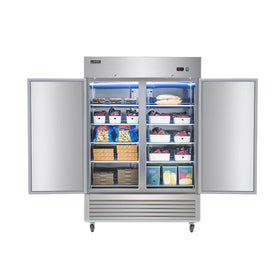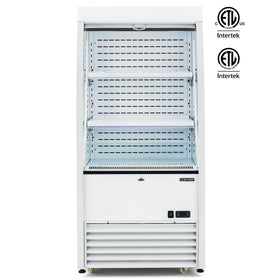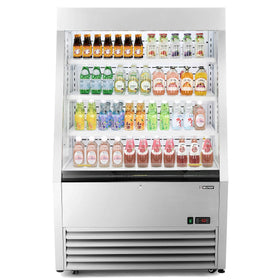In a high-stakes environment like a commercial restaurant kitchen, where food safety and equipment reliability can directly affect the health of customers and the success of a business, having certified equipment is more than a bonus—it's a necessity.
This is why certification plays a pivotal role in the commercial refrigeration industry.
But with so many different kinds of certifications available for commercial refrigerators, which should you go for?
Does using certified equipment offer any specific advantages to business owners/managers in the foodservice business?
Why Is Certification a Big Deal?
Obtaining certification is the most reliable way to ensure (and prove if need be) that your commercial refrigeration units meet specific safety, sanitation, and energy standards that might be required by the authorities or customers.
Using certified equipment also provides owners and food business managers with the confidence that their equipment will perform reliably under commercial conditions.
Here are four reasons why you might want to consider commercial refrigerator certification as a business owner.
- Certified refrigerators help you meet local health department regulations, which often require proof of sanitation and food safety.
- In the event of foodborne illness or equipment malfunction, certification can demonstrate due diligence and reduce legal liability.
- Many insurance companies mandate certified equipment to provide coverage.
- A well-run, safe kitchen boosts customer confidence and protects your brand.
Related: How UL Certification Helps Protect Food Safety in Your Commercial Kitchen
Types of Certifications for Commercial Refrigerators and Who Issues Them
There are several key certifications for commercial refrigerators. Each has a distinct focus, but together, they ensure comprehensive safety and performance standards. Understanding these different types of certification will help you examine your options and decide which best meets your needs.
1. UL (Underwriters Laboratories)
UL certification indicates that the appliance has been tested for risks such as electrical fires and grounding failures. It is issued by Underwriters Laboratories and focuses on electrical safety, fire resistance, and structural integrity
Obtaining UL certification confirms that the unit has been manufactured according to strict standards for commercial environments. They won’t short-circuit, catch fire, or pose a danger to staff.
Benefits of UL certification.
- Ensures compliance with fire and electrical codes
- Reduces insurance complications
- Increases customer and inspector confidence
There are many more benefits of UL certification, including compliance with fire codes, and it helps you avoid citations.
Related: What is UL Certification and Why Does it Matter for Commercial Refrigerators?
2. NSF/ANSI 7 (National Sanitation Foundation)
NSF certification ensures the refrigerator's interior and materials are safe for food contact. It is issued by NSF International and focuses on food safety and sanitation.
Obtaining NSF certification ensures that surfaces are easy to clean and that the unit maintains consistent food-safe temperatures. This is often required by local health departments and makes it easier to pass food safety inspections.
Benefits of NSF certification.
- Required by many health departments
- Ensures safe food storage
- Helps pass inspections with ease
3. ETL Listed Mark (Intertek)
ETL Listed is an alternative to UL certification. Issued by Intertek Testing Services, ETL certification focuses on product safety and sanitation (similar to UL). It also confirms that products meet North American safety standards. Intertek conducts similar testing to ensure quality and safety.
Benefits of Intertek Certification
- Meets the same standards as UL, often with faster certification turnaround
- Recognized by OSHA and local codes
ETL is functionally equivalent to UL and is also recognized by OSHA and building inspectors.
4. ENERGY STAR
The Energy Star certification is arguably the most popular certification for appliances like refrigerators.
ENERGY STAR-rated commercial refrigerators consume less energy, making them better for the environment and more cost-effective to operate. It is issued by the U.S. Environmental Protection Agency (EPA)
Benefits of Energy Star Rating
- Reduced energy bills
- Possible rebates from utility providers
- Supports environmental responsibility
All in all, an Energy Star-rated commercial refrigerator will help you reduce utility bills and may qualify you for rebates from local energy providers.
5. DOE Compliance (U.S. Department of Energy)
All commercial refrigeration units sold in the U.S. must meet DOE standards for energy consumption. DOE certification is issued by the U.S Department of Energy, and it confirms the unit meets legal requirements to be used within the U.S.
Benefits of DOE compliance/Certification
- Compliance with federal law
- Avoidance of penalties or product recalls
DOE ensures compliance with federal law and helps you avoid penalties or forced equipment removal.
Benefits of Certified Commercial Refrigerators for Business Owners
Owning a certified commercial refrigerator brings a host of advantages:
- Certified units are built to perform under rigorous conditions and come with quality assurance.
- Certifications often ensure the warranty remains valid, especially when paired with proper maintenance.
- Health and fire inspectors are more likely to approve certified equipment, reducing the risk of citations or shutdowns.
- Many certified refrigerators are energy efficient, which helps lower utility bills.
For customers, certification means that the food served is stored safely, reducing the risk of contamination and spoilage.
Related: How UL Certification Helps Protect Food Safety in Your Commercial Kitchen
How UL Certification Benefits Your Customers
Customers may never directly ask, “Is your refrigerator certified?” But they do care about the results of what certification provides:
- Properly stored food retains flavor and freshness.
- Certified equipment helps prevent temperature fluctuations that lead to foodborne illnesses.
- A clean, efficient kitchen reflects well on the overall customer experience.
In short, certification contributes to a restaurant’s credibility and customer satisfaction.
Make Certification Compliance Part of Your Business Culture
Choosing certified commercial refrigeration equipment isn’t just about passing inspections—it’s about protecting your business, your staff, and your customers. Whether it’s fire safety, food sanitation, or energy efficiency, certifications provide measurable, verifiable assurance that your equipment is up to the task.










